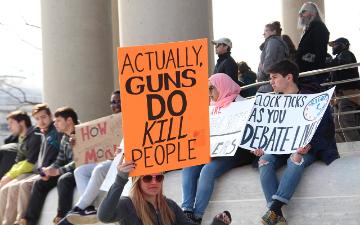
Avery Jensen/ CC BY-SA 4.0, via Wikimedia Commons
David E. DeCosse (@DavidDeCosse), director of the Religious & Catholic Ethics and Campus Ethics programs at the Markkula Center for Applied Ethics. Views are his own.
“Guns don't kill people; people kill people.”
Even a bad, popular idea like this default gun rights slogan trotted out after every mass shooting can have something true about it. So let's concede the obvious: It's true that in the case of mass shootings, a man (it's almost always a man) chooses to use a gun to slaughter people. The gun doesn't do the killing itself.
But no one is saying that the gun does the killing itself.
The slogan is invoked to get us to forget about guns or, even more, to argue that guns have no moral effect whatsoever on those that own them. The whole force of evil in these catastrophic mass shootings comes from elsewhere: It's not the consequence in any way of the gun or its marketer or its glorifying social media campaign or its manufacturer or the permissive gun laws or our increasingly cruel culture that turns to violence to resolve all sorts of problems.
But there's another twist embedded in this deceptive slogan. For gun-rights absolutists, it's not just that guns don't kill people. It's also that the individuals who commit these crimes are themselves not real people: They're monsters who don't so much make actual human choices but are tools of malevolent cosmic forces evident in phenomena like no prayer in public schools and boys raised by single moms.
And that cannot be true. These are real, if terrible, human choices—if choices that are influenced by many factors as our choices always are. We have to understand these choices to get to the root of the problem.
So, yes, guns don't kill people; people kill people. But guns can habituate people to killing. And that is clearly what is happening in our culture now.
"Habituate" is a complex but relevant word. It means in this case that things we have can affect the way we act: These things can affect our habits (hence the word "habituate"). In this view of ethics, a gun doesn't compel us to kill. But having a gun can begin to interact with our free will and our emotions and our values and incline us to act in certain ways. The mere possession of the gun can begin to figure in the development of habits that lapse slowly or explode suddenly into horrible violence. Or the possession of a gun can figure in the development of habits of responsible and safe ownership.
By thinking of guns this way, we can see different paths of gun ownership, each with a distinctive set of habits, values, laws, and stories. Millions of Americans own guns in order to hunt. In such families, parents habituate children into the wise use of guns in service to values of family, sustenance, and nature. Many Americans also own handguns for legitimate reasons of self-defense. In such cases, owners are motivated by a reasonable fear of a threat.
But, obviously, our problem now has nothing to do with owning guns for hunting or for reasonable concerns for self-defense. Our problem now is the way that a glorified, powerful military technology like an AR-15 interacts with a desolate American individualism to foster habits of idolization and aggression and contempt that find in the gun a means to solve problems in the worst possible way.
Catholic Bishop Daniel Flores of Brownsville, Texas, put this powerfully in an interview after the Uvalde shooting: "Guns then become sort of...tools in a society where despair is spreading, especially in the younger generations. And then they become the instruments of what we're seeing. So no, it's not either-or, at all—rather one sort of facilitates the other."
He added in a tweet on the day after the shooting: "Don't tell me that guns aren't the problem, people are. I'm sick of hearing it. The darkness first takes our children, using the guns that are easier to obtain than aspirin. We sacralize death's instruments and then are surprised that death uses them."
So let's reject once and for all this deceptive slogan. Let's pass laws that habituate a sense of responsibility among gun owners, especially young ones. And let's face squarely the despair that is spreading in our country and the way that an AR-15 has become an idol, evoking habits of self-deluded power and racialized, murderous contempt.